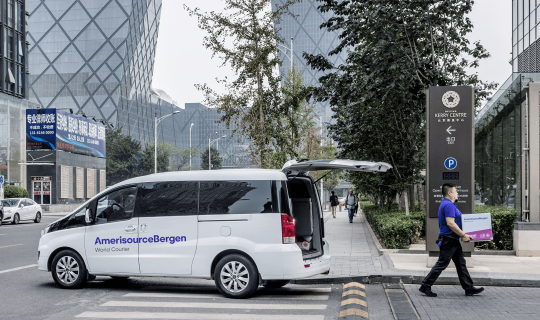Article: Russia - A Country in Focus
By World Courier
This article first appeared in the Journal of Clinical Studies, Apr 2016
The largest country in the world, Russia is bigger than Pluto at 16.6million km2, and is separated from the USA by less than 4 km. Still nominally at war since 1945 with Japan over the Kuril Islands, it has 20% of the world’s unfrozen fresh water in a single lake, Lake Baikal. It spans nine time zones, has 28 official languages and has the world’s longest railway. The first Russian child to receive the vaccine against smallpox was called “Vaccinov,” given a pension, and observed throughout his life.
Today’s Russian clinical trial market is worth 880 million dollars and there is every expectation that it will continue to grow. The only question is, at what rate? If growth remains, then, at the current rate of 4.65 per cent per year to 2020, then there will be approximately 1086 new studies compared to a total of 790 in 2013. The main contribution will be made by big pharma sponsors and a growth in local and bioequivalence studies stimulated by Russia’s Pharma 2020 programme. Once any myths about the Russian clinical trial market are dispelled, the number of international clinical trials is expected to grow at CAGR of 11.4%; the total number of studies should almost double in 2020, and the total clinical trial market in Russia should hit a value of 1.6 billion dollars.
The Ministry of Health of the Russian Federation approved 802 new clinical trials of all types, including local and bioequivalence studies, during 2015. This represents a 7% increase over 2014.
Clinical trials in Russia in 2015 were sponsored by companies from 40 countries. The greatest number of trials (337) were initiated by Russian sponsors. American sponsors, with 117 new studies, took the runner-up place; then India sponsors with 62 new trials, Swiss sponsors with 53 trials, German sponsors with 30 studies, followed by UK sponsors with 26 studies and French sponsors with 23 studies. The group of leaders is concluded by Belgian sponsors, having 16 new studies.
A total of 51,338 patients were enrolled into studies started in 2015.
What makes Russia an attractive market for conducting clinical trials?
- The Center for Drug Evaluation & Research (CDER) of the FDA approved 123 new drugs => 50 of the studied in clinical trials conducted in Russia.
- The Committee for Medicinal Products for Human Use (CHMP) of the EMA gave positive recommendations on 113 new drug applications => 71 of the drugs which received positive opinions tested in clinical trials in Russia.
- Vast population of 145 million.
- 89 administrative regions.
- Appealing patient pool of treatment-naïve patients.
- Faster patient recruitment (Russia is now among the top five recruiting countries).
- Lower costs.
- Centralised medical system.
- 1099 hospitals entitled to conduct clinical trials.
- Experienced and professional investigators.
- Faster completion of Phase III CT => getting the drug to market faster => earlier relief to patients, faster return on investment, edge over competition, longer patent protection.
- Traditionally, Moscow and Saint Petersburg have been considered to combine all key study benefits. About 90 per cent of key opinion leaders involved in the study are concentrated in the hospitals of these cities. Secondly, high patient recruitment is provided by access to a large patient population – 10-15 per cent of Russia’s total population lives in Moscow or Saint Petersburg.
- However, the experience of companies conducting CT has suggested that regional sites are often better recruiters, and that the future of the Russian clinical trials industry lies in these regions. In addition to better enrolment, the use of regional cities with a relatively large number of sites lowers overheads and monitoring-visit-related expenses. The average monitoring costs can be cut even further – potentially up to 40 per cent – by visiting more than one site per trip and travel costs can even vanish if a local monitoring field team is used. Local CROs also have the largest geographical span across Russia. The key to study success is the well-balanced combination of sites in Moscow and Saint Petersburg involving key opinion leaders, and the regional sites which are keen to recruit.
- Even though the total number of patients enrolled for clinical trials in the US is still much higher than in any other country, there is an evident shift in patient recruitment away from core Western countries to the so-called emerging clinical trial markets. The Russian Federation is now among the top five recruiting countries, enrolling substantially more patients than some of the established EU countries such as France and the UK. The number of patients estimated to have been enrolled in new studies launched in Russia during 2014 was 58,707 patients.
There have been many worries about Russian respect for intellectual property. Many people believe that Russia has poor protection for intellectual property and is a source of piracy and poor IP security. This is simply not true and can be argued with the following statements.
- Russia is a member of all key international IP treaties and conventions (11 treaties and conventions).
- IP protection in Russia is based upon the Russian Civil Code plus orders and administrative regulations issued by the Russian Agency for Patents and Trademarks (Rospatent).
Russia acceded to the World Trade Organization (WTO) in 2012, which resulted in:
- General reform of the Russian IP protection law (2008-2012).
- Special IP protection court established in 2013.
- New “anti-piracy” law to protect copyright and internet rights introduced in 2013.
- Further improvements of the confidentiality and personal data law to conform to European legal standards (2012-2013).
GMP standards in Russia were specified in a federal law 61 FZ on Jan 1st, 2014, with a transition period of 2-3 years.
Sending pharmaceuticals into Russia requires acknowledgment of the issue. Comparator and associated drugs only, due to the intellectual property rights protection issue, require a permission letter from the manufacturer of the drugs, stating that they do not object to the usage of these drugs within a certain trial. This ‘no objection’ letter can either be provided by the Russian representative office of a relevant manufacturer (trademark rep office) or by a foreign manufacturer. This clearly has significant implications for study design.
All shipments require Certificate of Analysis or/and Certificate of Release with lot number and expiry date. When sending registered commercial drugs a “Quality Certificate” needed. Import Permit from the Ministry of Healthcare with reference to imported goods and study reference number, and an Invoice showing Incoterms.
The invoice should be sent in advance and include the number of boxes with weights and dimensions. These allow for the import permit application. Once this is issued and the OK has been given to send, no changes can be made to the approved invoice (including the date). The Customs invoice must be translated into Russian, and must include
- Net weight of each position (item) must be shown in invoice
- Each type of packaging used and included in the shipment
- Primary packaging used for tablets or solutions, like blister or vial
- Inner packaging used for kits, like small cardboard boxes
- Outer packaging used for the whole shipment, like cardboard or thermal boxes
The consignee must also provide a letter to Customs, supplying registration for customs.
Russia offers huge opportunities for studies with huge populations of prospective patients, but it takes care and attention to deal with their exacting requirements. We should all say hello or Здравствуйте to this amazing country.



